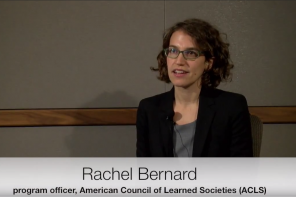
Q: I’ve done a bunch of informational interviews lately, and they’ve been really helpful. But everyone I’ve talked to says my PhD isn’t enough—I need work experience. I came straight into grad school from my undergraduate program, and I’ve never worked full-time. How do I get work experience? What kind should I get? And how am I going to fit it in and still get my research done?
A: You’ve hit on one of the trickier aspects of transitioning from an academic career to something else, whatever that might be: the need for work experience. It’s true that your PhD on its own probably won’t be enough to land you that first job. Hiring the wrong person can be costly for a company, so hiring managers tend to be cautious. A PhD tells employers that you can do in-depth research and that you have expert knowledge of a certain subject area. It doesn’t always tell them whether you have the specific skills needed for a certain field. For that, you really need transitional work experience.
The good news is that there are a lot of ways to find transitional experience. Research and informational interviews can help you identify particular fields that you’re interested in and that you can target when looking for work. Informational interviews will also give you a network of contacts; even if you’re not ready to start looking for work at the time of the interview, if you maintain a good relationship with that person, you can contact them later and see if they or anyone they know might want some part-time help. Even if it’s only a short-term project, it will give you a taste of what it’s like to work in that field and give you a valuable reference who can speak to your work.
If you’re thinking mostly about the type of work that has traditionally been referred to as “alt-ac”—that is, jobs within higher education—then I have some good news for you. There are some great internship programs in higher education administration popping up around the country, at places like Columbia University, the University of Miami, the University of California Humanities Research Institute, and Brown University. Even if your university doesn’t have such a program, you can still find alt-ac opportunities; you might just need to be a bit more proactive. At Stanford, we didn’t have an official internship program, but there were a lot of opportunities available if you kept your ear to the ground and let people know you were interested.
For jobs outside the university, I recommend heading to your campus career office. They may have a list of internships for graduate students, but if they don’t—or if none of them are right for you—ask to see their list of internships for undergrads. You won’t be eligible for some of them, but it’s worth writing specific places to inquire about possibilities for graduate students. Maybe that company or institution never even thought about having a PhD come work for them for the summer! Even if they can’t offer you anything immediately, you can ask about conducting informational interviews. You never know what future opportunities might result.
Finally, I want to address your question about time, because it’s an important one. Research is why you went to grad school, and it’s what your university pays you to do. It’s crucial to prioritize your research and make sure that you continue to make progress, because, as I’ve noted elsewhere, finishing your PhD in a timely manner is important. But making progress does not preclude doing things other than your research, and if you are looking to transition out of academia, it is important that you carve out the time for other types of work experience.
That having been said, how you carve out that time is up to you, and it depends a lot on your work habits. If you’re someone who really needs a long stretch of uninterrupted time to get any writing done, then you might decide to work full-time during an unfunded summer or devote one day a week to a part-time job and do your research the rest of the time. Alternatively, if you’re someone who works better in smaller chunks of time, you might decide that your mornings are for your dissertation and your afternoons are for everything else. These are just a few of the many potentially viable options.
Counterintuitively, you may find that having obligations outside your research actually makes you more efficient; I certainly found that I was much more focused when I knew I had three hours in which to reach my daily word count than when I knew I had eight. Not everyone works that way, of course, and it’s important to be mindful of how you’re spending your time; you don’t want to turn around one day and realize you haven’t touched your research in three months. But carving out the space in your busy schedule for transitional work experience can be deeply rewarding, and in the long run it is absolutely worth the time.






